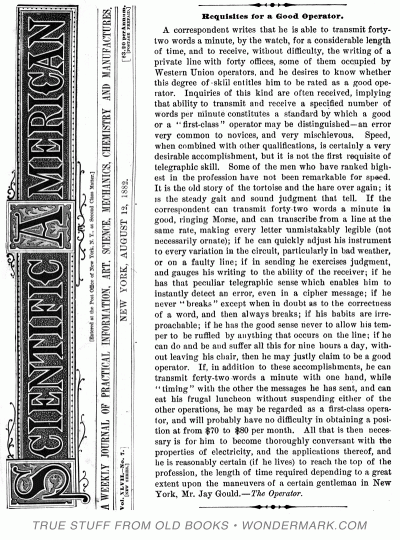I really enjoyed this brief article in the August 12, 1882 Scientific American, entitled “Requisites for a Good Operator.” In it, a hotshot telegraph operator writes Sci-Am to ask if he might possibly be one of the best operators around, on account of his transmission speed (42 words per minute!). The magazine’s in-house telegraph expert replies with a succinct dismissal of the notion that speed makes the man, and rounds out a description of a good operator that makes me want to take up the telegraph, such is the wisdom and character of the figure it describes. All this with a little sarcasm at the end as well (“You’re playing around and timing yourself on your lunch break, right? Don’t electrocute yourself, genius”). Click the image for a larger version, or a full transcription of the text is after the jump.
Requisites for a Good Operator.
A correspondent writes that he is able to transmit forty-two words a minute, by the watch, for a considerable length of time, and to receive, without difficulty, the writing of a private line with forty offices, some of them occupied by Western Union operators, and he desires to know whether this degree of skill entitles him to be rated as a good operator.
Inquiries of this kind are often received, implying that ability to transmit and receive a specified number of words per minute constitutes a standard by which a good or a “first-class” operator may be distinguished — an error very common to novices, and very mischievous. Speed, when combined with other qualifications, is certainly a very desirable accomplishment, but it is not the first requisite of telegraphic skill. Some of the men who have ranked highest in the profession have not been remarkable for speed. It is the old story of the tortoise and the hare over again; it is the steady gait and sound judgment that tell.
If the correspondent can transmit forty-two words a minute in good, ringing Morse, and can transcribe from a line at the same rate, making every letter unmistakably legible (not necessarily ornate); if he can quickly adjust his instrument to every variation in the circuit, particularly in bad weather, or on a faulty line; if in sending he exercises judgment, and gauges his writing to the ability of the receiver; if he has that peculiar telegraphic sense which enables him to instantly detect an error, even in a cipher message; if he never “breaks” except when in doubt as to the correctness of a word, and then always breaks; if his habits are irreproachable; if he has the good sense never to allow his temper to be ruffled by anything that occurs on the line; if he can do and be and suffer all this for nine hours a day, without leaving his chair, then he may justly claim to be a good operator.
If, in addition to these accomplishments, he can transmit forty-two words a minute with one hand, while “timing” with the other the messages he has sent, and can eat his frugal luncheon without suspending either of the other operations, he may be regarded as a first-class operator, and will probably have no difficulty in obtaining a position at from $70 to $80 per month. All that is then necessary is for him to become thoroughly conversant with the properties of electricity, and the applications thereof, and he is reasonably certain (if he lives) to reach the top of the profession, the length of time required depending to a great extend upon the maneuvers of a certain gentleman in New York, Mr. Jay Gould. — The Operator.
[Note: the infamous “robber baron” Jay Gould owned a controlling interest in Western Union at the time.]


This reminds me so much of ‘Remains of the Day’, in which characters discuss at length what constitutes a ‘great’ butler.
congratulations. wondermark has been named #7 on the list of most awesome webcomics: http://dancewithsunflowers.blogspot.com/2009/09/marmaduke-would-look-quite-dapper-in.html
i know that you have a problem with people calling what you do a comic, so i’ll understand if you don’t show up for the award ceremony.
dr.
My son enjoys the retro experience of riding the California Zephyr to Knox College in Galesburg IL. Last week we observed the “Telegraph” sign at Denver Union Station and shared the thrill of imagining a time when communicating over wires at the speed of tapping a button must have seemed magical.
He texted me morse code from flooded Iowa–a bizarre combination of communications technology when you think about it–but I found it impossible to translate without crucial letter-break and word-break pauses described at http://en.wikipedia.org/wiki/Morse_code. Even if you don’t read the whole article, find the word “fist” and add that delightful term to your writer’s inventory.
Within a week you posted this story. Nice coincidence.
By the way, we love your work.
$70 to $80 a month? STOP
I’m worth at least twice that! STOP
When I read “that peculiar telegraphic sense,” I immediately pictured a Victorian version of J. Jonah Jameson demanding illustrations of Spider-Man. Of course, I probably would have been thinking about that anyway, but…
I’ve known a few ham radio guys who definitely qualified as “first class operators” when it came to high-speed Morse code. Although, since their interest was conversing, not passing traffic for others, writing legibly didn’t come into it — they most copied by ear. At speeds over 40 wpm the language centers of the brain become involved and in many cases operators are no longer hearing dots and dashes, or individual characters, but whole words.
Wow. Just amazing work! You sir, have a new fan.
Love old stuff. Google has all the popular science mags from the early 1900’s too!